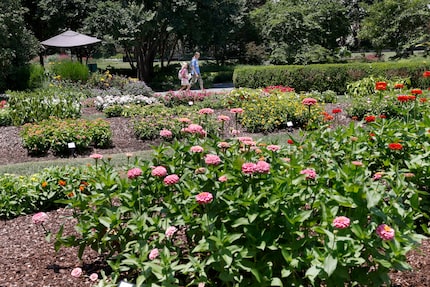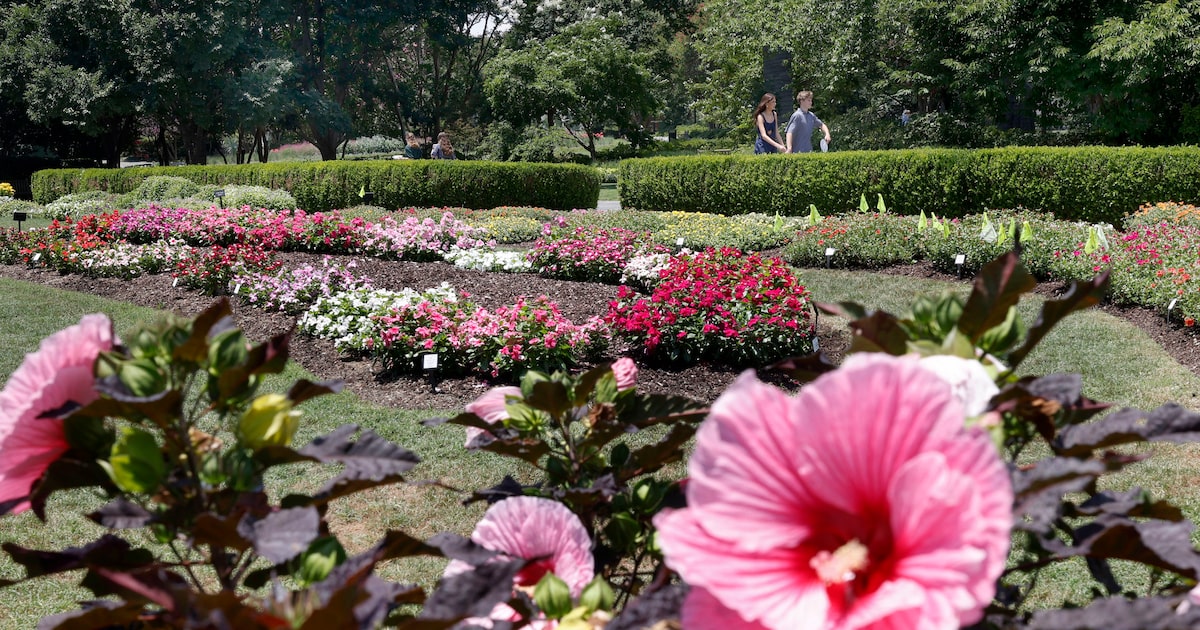Sun hats, breezy button-ups and denim – the audience for the Dallas Arboretum’s annual field day looked largely ready to get to work in the garden themselves.
While the presentation of this year’s findings took place in a climate-controlled ballroom, the attendees were primarily local industry professionals who spend their days growing plants and designing gardens. Attendees mingled before taking in more than 100 slides of plant data, learning about the work of the arboretum’s trial garden.
While many think of the Dallas Arboretum as an idyllic backdrop for a stroll or a photoshoot, it’s also an active education and research community. The trial gardens evaluate the success of thousands of plant varieties each year in the uniquely challenging climes of North Texas.
Each year, they develop two lists of high-performing varieties: The “Arboretum Approved” list features plants that did well through fall, winter and spring while the “Flameproof” list highlights plants resilient enough to still thrive during the 100-degree days. About half of this year’s top performers made it onto both lists.
D-FW Weather Wise
Several varieties of caladiums and coleuses were year-round winners, while several portulacas and fan flowers made it onto the flameproof list. More information about previous years’ results can be found on the plant trials website.
 Megan Proska, associate vice president of Horticulture and Collections at the Dallas Arboretum, speaks during the annual Plant Trials Field Day at the arboretum, Wednesday, June 25, 2025, in Dallas. (Chitose Suzuki / Staff Photographer)
Megan Proska, associate vice president of Horticulture and Collections at the Dallas Arboretum, speaks during the annual Plant Trials Field Day at the arboretum, Wednesday, June 25, 2025, in Dallas. (Chitose Suzuki / Staff Photographer)
Megan Proska, who oversees the project, said plant breeders are always introducing new varieties with potential improvements, and the trial garden helps to test the effectiveness of those changes. In any given year, the garden grows and tracks between 3,000 and 5,000 plants.
“There are a lot of varieties on the market, and we’re always looking for the best variety for our area,” she said.
It’s primarily landscapers, plant nurseries and other industry folk who pay close attention to the results. She said growers and local plant stores will often coordinate which colors and variegations perform best, eliminating the need for casual hobbyists to get that far into the weeds. However, Proska said some avid local gardeners will regularly reach out to ask about which varieties she recommends.
Emily Quimby with Green Lake Nursery, a local wholesale plant grower, said they appreciate the work of the trial garden because it does a lot of the “legwork” testing new varieties. There are too many plants to grow, so they appreciate knowing what will work.
“If something is going to die two weeks after you plant it, we don’t want to continue to grow that because it’s got to be a good value and a good plant for our customers,” she said.
That service is part of why Green Lake Nursery has been sponsoring the trial garden for decades. She said she wasn’t particularly surprised by this year’s findings, but still appreciates the opportunity to stay in touch with developments in the industry.
 The Trial Garden at the Dallas Arboretum is seen Wednesday, June 25, 2025, in Dallas. (Chitose Suzuki / Staff Photographer)
The Trial Garden at the Dallas Arboretum is seen Wednesday, June 25, 2025, in Dallas. (Chitose Suzuki / Staff Photographer)
Other attendees praised the annual field day for similar reasons. Rachel Harned, of BrightView Landscape Development, said she appreciates the opportunity to keep up with industry developments and be among fellow plant enthusiasts.
She regularly takes inspiration from the arboretum generally, seeing how staff pair different colors and incorporate perennials, since she works with those the most in commercial spaces.
“It’s my opportunity to get to learn more and keep up, and it’s just fun,” Harned said.
